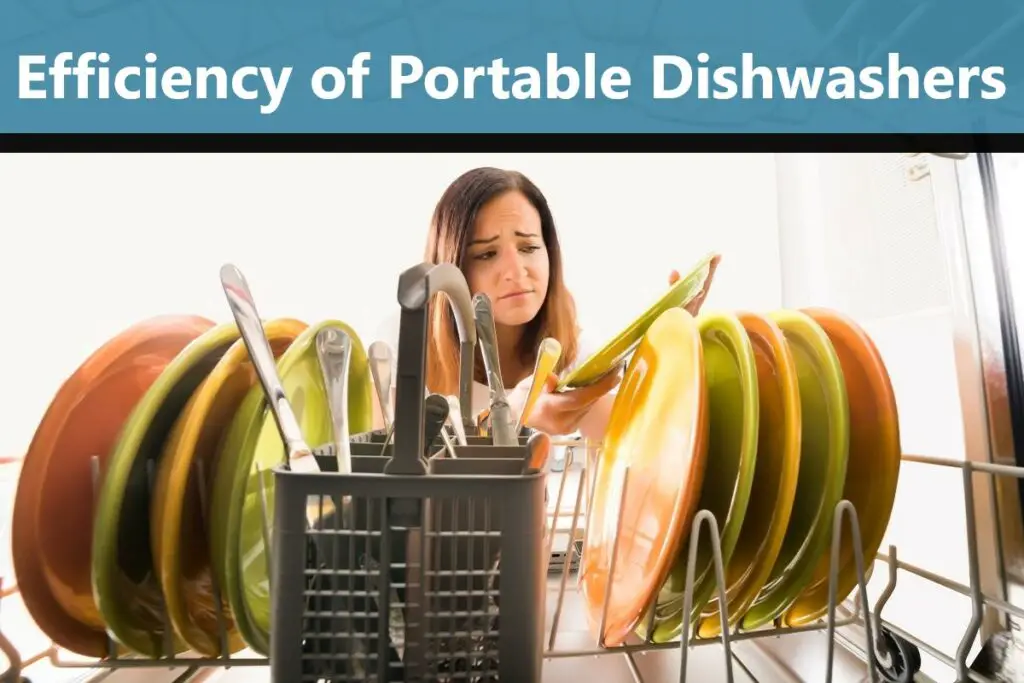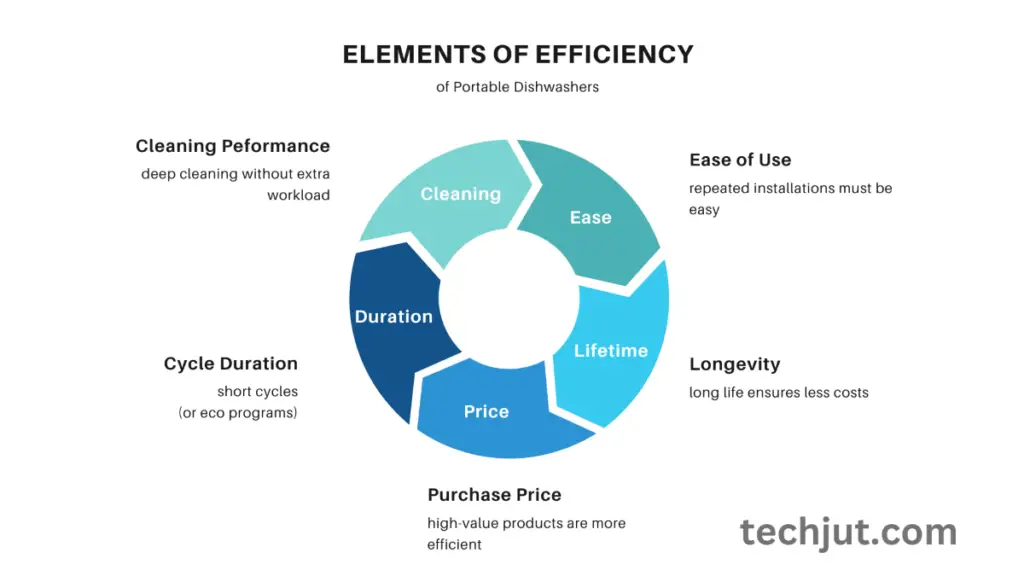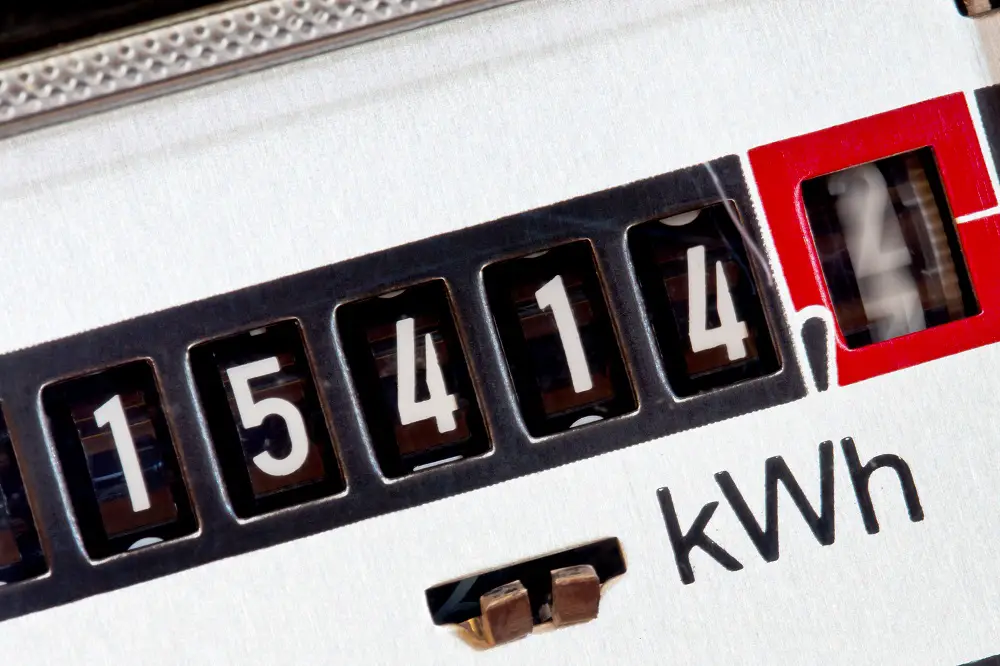Countertop dishwashers are a convenient and space-saving solution for efficient dish cleaning. While these appliances are known to be more energy- and water-efficient than handwashing, are countertop dishwashers efficient overall?
The efficiency of countertop appliances applies to a smaller number of dishes and seems like a better option than handwashing. However, multiple cycles are required for more dishes beyond the dishwasher capacity, reducing the overall efficiency.

Let’s look into the factors that determine the efficiency of a dishwasher, followed by the different costs involved in running a countertop dishwasher. This will help determine whether countertop dishwashers are really efficient.
Table of Contents
Elements of Efficiency
Determining the efficiency of countertop dishwashers is not a straightforward matter since it depends on several variables. Therefore, the answer to the question ‘Are countertop dishwashers efficient?’ is not simple.
Here are some essential factors to assess the efficiency of a countertop dishwasher:

- Cleaning Performance
Efficient dishwashers will clean dishes effectively without having to pre-rinse or rewash.
Countertop dishwashers with multiple wash cycles will suit different loads and ensure proper cleaning.
- Cycle Duration
The duration of the wash cycle affects a dishwasher’s energy and water consumption. Shorter cycles are generally more efficient, but may not effectively clean heavily soiled dishes. However, new models now come with eco programs that use less water and energy than normal cycles but take longer to complete.
- Ease of Use
A dishwasher’s efficiency is also determined by its ease of use.
From the first-time installation to regular use, factors like an intuitive control panel, display or indicator lights with error codes, and easy-to-install connections ensure ease of use.
- Longevity
An efficient countertop dishwasher must last long and not require regular servicing.
Dishwashers with durable materials like stainless steel or high-quality plastics tend to last longer.
Proper installation, regular maintenance, and proper care can maintain a reliable dishwasher’s longevity.
- Purchase Price
While a countertop dishwasher’s purchase price doesn’t directly determine its efficiency, ones that cost more than average are bound to last longer too. Often, the cheaper appliances aren’t as efficient since they may experience problems requiring frequent servicing.
Apart from these factors, the water and energy usage of dishwashers is vital in determining their efficiency.
Water Consumption

Water usage is a crucial factor that determines appliance efficiency. While dishwashers are generally more efficient than handwashing, the less water the appliance uses, the better the choice.
Typically, handwashing a load of dishes can use up to 27 gallons of water, whereas countertop dishwashers are more efficient and use only about 2 – 3 gallons.
However, some models use even less, especially ones with a built-in water tank that can be manually filled.
Countertop dishwashers with load-sensing technology and adjustable settings can adjust water usage based on the soil level of the dishes.
Additionally, water-saving wash cycles like Eco or energy-saving modes are programmed to use less water without compromising cleaning performance.
Overall, countertop dishwashers that prioritize water usage optimization while delivering effective dish cleaning are efficient.
You should also read our article about the actual water costs of different portable dishwashers.
Electricity Consumption

Energy or electricity consumption is another crucial factor determining dishwasher efficiency. These compact appliances are designed to save water and minimize energy usage.
The average electricity consumption of countertop dishwashers is about 1200 – 1800 Watts (1.2 – 1.8 kWh) per cycle.
Appliances with Energy Star certification are energy-efficient and are designed to maintain optimal performance while using less energy.
Countertop dishwashers with energy-saving modes or cycles will further reduce energy consumption. Such modes adjust the wash time, water temperature, and drying methods to optimize energy efficiency.
Costs Per Cycle
Now that we’ve seen the different elements involved in determining the efficiency of countertop dishwashers, let’s look at the costs involved for various wash cycles.
Considering the average energy charge in the USA is about 23 cents per kilowatt-hour (kWh) and an average cost of $0.0015 per gallon of water, we calculate the related costs per cycle.
The total cost will include the energy and water costs involved per cycle. The annual total cost is calculated assuming the dishwasher is run daily.
| Cycle (Minutes) | Energy Cost | Water Cost | Total Cost | Annual Total Cost |
|---|---|---|---|---|
| Fast (45) | $0.0713 | $0.0042 | $0.0755 | $27.56 |
| Normal (110) | $0.0828 | $0.0043 | $0.0871 | $31.79 |
| Eco (75) | $0.0621 | $0.004 | $0.0661 | $24.13 |
| Heavy (100) | $0.113 | $0.005 | $0.118 | $43.07 |
The costs of the wash cycles are the least for the Eco cycle and the most for the Heavy cycle. While these costs are definitely lesser than those of built-ins or freestanding models, the same cannot be said when compared to handwashing.
While handwashing does not involve energy costs, the water costs are more than a countertop dishwasher.
However, the overall cost of handwashing could still be less than that of a countertop appliance if some efficient techniques are followed.
If your objective of getting a countertop dishwasher is to reduce the total cost of washing dishes, then despite it being water-efficient, it’s probably not worth it.
Cost Per Full-Size Dish
Countertop dishwashers have an average load capacity of six place settings. Whether you run a half or full load, the costs for the different wash cycles remain the same.
And while you can load plates, bowls, glasses, and cups in a countertop appliance, you can’t load pots and pans. Also, in terms of cost per full-size dish, these dishwashers lag.
Considering that you can load an average of 30 dishes in a countertop appliance of six place settings, here are the related annual costs of washing a full-size dish:
| Cycle | Total Cost | Cost/Full-Size Dish |
|---|---|---|
| Fast | $27.56 | $0.919 |
| Normal | $31.79 | $1.06 |
| Eco | $24.13 | $0.804 |
| Heavy | $43.07 | $1.44 |
Compared to an Energy Star-rated freestanding or built-in dishwasher, the cost involved for a full-size dish is more for a countertop dishwasher.
While the difference in cost might only be a matter of a few cents, it’s definitely a deciding factor for the efficiency of dishwashers.
If you prefer portable dishwashers and need a higher capacity, you should check the best full-size portable dishwashers.
Countertop Dishwashers Are (Not) Efficient
Countertop dishwashers are generally considered an efficient option for reducing the task of washing a few dishes.
However, a detailed look into the factors determining efficiency and the related costs per cycle and full-size dish brings a different view.
- Are countertop dishwashers efficient for washing larger loads? – No
- Can countertop dishwashers wash pots and pans? – No
- Do countertop dishwashers clean effectively? – Yes
- Are the costs per cycle of countertop dishwashers less? – Yes
- Is the cost per full-sized dish for a countertop less than for bigger models? – No
While countertop models can wash as effectively as built-ins or freestanding, the reduced capacity and comparatively higher cost per full-sized dish are drawbacks.
Conclusion
Dishwashers, in general, have been considered an effective choice over handwashing owing to their convenience, efficiency, and ease of use.
While built-ins or freestanding models are designed to handle larger loads, including pots and pans, countertop dishwashers are suitable for smaller loads.
To answer the question, ‘Are countertop dishwashers efficient?’, the factors considered included water and energy consumption, among others.
Despite the cost per cycle of a countertop being less than built-ins or freestanding appliances, the cost per full-sized dish turns out to be more.
Together with the reduced capacity of a countertop machine, it turns out that these dishwashers aren’t really as efficient as one would assume.
However, there are several circumstances when countertops are the perfect choice. Read into the 8 Reasons a Countertop Dishwasher Is Worth It.




Wow, I never knew there was so much to consider about countertop dishwashers. Always thought they were plain simple. Water and electricity consumption are critical points indeed.
Need to figure if the running costs of these dishwashers are worth it in a small apartment. Any advice?
Bryan, consider how often you’d use it vs. handwashing. If you eat at home often, it might save you time and water in the long run!
I’m curious about the environmental impact. Using less water is good, but what about the energy consumption?
got one of these at my dorm. makes life so much easier, not having to wash dishes all the time. energy-wise, haven’t noticed much diff on my bill.
So, basically, I could be saving some water but at the cost of electricity? Seems like trading one bill for another. Tell me I’m wrong.
Love my countertop dishwasher! Huge time saver for this busy mom. Worth every penny.
Not convinced these are any better than the good old sink. Do they really clean as well?
Absolutely, RickyT! They’re surprisingly effective, even on tough stains.
Was skeptical too until I tried one. Never going back to manual washing.
One has to wonder if the convenience of these compact dishwashers offsets the initial investment and ongoing expenses. A detailed cost-benefit analysis might reveal they’re not for everyone.
Every little gadget to make life easier is a yay in my book. Go, countertop dishwashers!
Couldn’t agree more, every second saved is precious here!
Is the convenience of a countertop dishwasher really worth the trade-offs in space and energy? Makes you think.